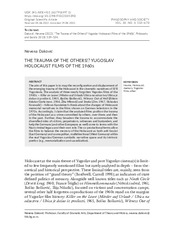Приказ основних података о документу
The Trauma of the Others!? Yugoslav Holocaust Films of the 1960s
Trauma drugih!? Jugoslovenski filmovi o holokaustu iz 1960-ih godina
| dc.creator | Daković, Nevena | |
| dc.date.accessioned | 2022-10-26T08:50:49Z | |
| dc.date.available | 2022-10-26T08:50:49Z | |
| dc.date.issued | 2022 | |
| dc.identifier.issn | 0353-5738 | |
| dc.identifier.uri | http://rifdt.instifdt.bg.ac.rs/123456789/2688 | |
| dc.description.abstract | The aim of this paper is to map the reconfiguration and displacement of the emerging trauma of the Holocaust in the cinematic narratives of SFR Yugoslavia. The analysis of three nearly forgotten Yugoslav films of the 1960s – Killer on Leave (Mörder auf Urlaub/Ubica na odsustvu/Ubica je došao iz prošlosti, 1965, Boško Bošković), Witness Out of Hell (Bittere Kräuter/Gorke trave, 1966, Žika Mitrović) and Smoke (Dim, 1967, Slobodan Kosovalić) – follows Kansteiner’s thesis about the changes of Holocaust memorial narratives in the films shown on German television in the 1970s. Accordingly, I claim that the analyzed films position the trauma of the Holocaust as a crime committed by others, over there, and then in the past. Further, they broaden the trauma to accommodate the diversified roles of victims, perpetrators, witnesses and bystanders, and help the Germans (and other Europeans as well) come to terms with the Nazi criminal legacy and their own role. The co-productional terms allow the films to balance the memory of the Holocaust as both anti-fascist (East Germany) and cosmopolitan, multidirectional (West Germany) within the real Yugoslav/German symbolic narrative space and its intrinsic poetics (e.g., memorialization and sacralization). | sr |
| dc.description.abstract | Cilj ovog rada je da mapira rekonfiguraciju i izmeštanje traume Holokausta u nastajanju u kinematografskim narativima SFR Jugoslavije. Analiza tri skoro zaboravljena jugoslovenska filma iz 1960-ih godina – Ubica na odsustvu (1965, Boško Bošković), Svedok iz pakla (1966, Mitrović) i Dim (1967, Slobodan Kosovalić) – prati Kanštajnerovu tezu o promenama memorijalnih narativa Holokausta u filmovima prikazivanim na nemačkoj televiziji 1970-ih godina. Shodno tome, tvrdim da analizirani filmovi traumu Holokausta pozicioniraju kao zločin koji su počinili drugi, negde, a zatim u prošlosti. Dalje, oni proširuju traumu da bi se prilagodili raznovrsnim ulogama žrtava, počinilaca, svedoka i posmatrača, i pomažu Nemcima (i drugimEvropljanima) da se pomire sa nacističkim zločinačkim nasleđem i sopstvenom ulogom. Koprodukcijski termini omogućavaju filmovima da uravnoteže sećanje na Holokaust, kao i antifašističko (Istočna Nemačka) i kosmopolitsko, višesmerno (Zapadna Nemačka) u okviru stvarnog jugoslovenskog/nemačkog simboličkog narativnog prostora i njegove unutrašnje poetike (na primer, memorijalizacija i sakralizacija). | sr |
| dc.language.iso | en | sr |
| dc.publisher | Beograd : Institut za filozofiju i društvenu teoriju | sr |
| dc.rights | openAccess | sr |
| dc.rights.uri | https://creativecommons.org/licenses/by-nc-nd/4.0/ | |
| dc.source | Filozofija i društvo / Philosophy and Society | sr |
| dc.subject | trauma | sr |
| dc.subject | Holocaust | sr |
| dc.subject | memory | sr |
| dc.subject | Yugoslav films | sr |
| dc.subject | other | sr |
| dc.title | The Trauma of the Others!? Yugoslav Holocaust Films of the 1960s | sr |
| dc.title | Trauma drugih!? Jugoslovenski filmovi o holokaustu iz 1960-ih godina | sr |
| dc.type | article | sr |
| dc.rights.license | BY-NC-ND | sr |
| dc.citation.issue | 3 | |
| dc.citation.volume | 33 | |
| dc.citation.spage | 519 | |
| dc.citation.epage | 534 | |
| dc.identifier.doi | 10.2298/FID2203519D | |
| dc.type.version | publishedVersion | sr |
| dc.identifier.fulltext | http://rifdt.instifdt.bg.ac.rs/bitstream/id/9381/bitstream_9381.pdf |

